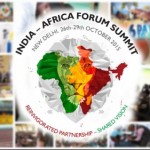Prime Minister Narendra Modi has turned to Africa, with a grand India Africa Forum Summit (IAFS III) in New Delhi this week, which has the potential to reset India-Africa ties and give an impetus to Modi’s foreign policy strategy.
The summit is the first exclusive platform for Modi, since his election in May 2014, to meet and engage with a broad swathe of African leaders. Modi is yet to visit Africa and has not set out an Africa policy—and this may be about to change. Over 50 heads of African countries are attending, which indicates the scale of this summit, since less than 15 came for the earlier two iterations in 2008 and 2011. [1]
The summit is likely to be high on symbolism and camaraderie too—for example, India, by stating that it is not a party to the Rome Statute (which established the International Criminal Court) has already denied a call by the ICC Office of the Prosecutor to arrest Sudanese President Omar Al-Bashir, who is wanted by the court for war crimes in Darfur.
In the last decade, ‘Africa’ summits have become an international ‘trend’. China has held five such summits since 2000, the last one in Beijing in 2012. Another summit of leaders from China and African countries is scheduled for December 2015, to be held in South Africa. U.S. President Barack Obama, too, hosted the first-of-its kind U.S.-Africa Leaders Summit in August 2014 in Washington DC. France, Germany, and Turkey too have convened their own events, to deepen their various strands of engagement with Africa.
Russia is absent from this mix, so far. But most other global powers don’t want to miss out on a share of the African pie of abundant natural resources and large growing markets. Lofty declarations and grand promises have been the flavours at these Africa-focused events. Will IAFS-III be any different? What would a successful Africa summit in India look like?
The robust African attendance in New Delhi is one indicator of success. But it is also important for India to formulate its ties with Africa in more strategic terms. For long, India’s engagement with Africa was cooked in the pot of non-alignment, anti-apartheid, and decolonisation. While that epoch is over, India’s Africa policy appears not to have undergone a much-needed transition.
Now though, India’s growing focus on Africa appears to be driven by a multiplicity of factors, including the need to project or retain national power abroad, and access Africa’s natural resources and markets. Hosting over 50 heads of African states gives India a chance to deepen the relationship and open access to newer markets.
But it faces stiff competition from China for both economic and geostrategic space in Africa. While India’s current trade with Africa is valued at around $70 billion [2], the trade volume in 2010 between China and Africa reached $127 billion [3].
According to Deborah Brautigam, U.S. academic and author, China has a dual approach to its economic ties with Africa: offer resource-backed development loans to oil and mineral-rich nations, and develop special trade and economic cooperation zones in several states, including Nigeria, Ethiopia, and Zambia. At other times, it provides low-interest loans to countries with low credit ratings and in exchange secures favorable rights to develop oil, infrastructure, and mining projects [4].
India has fallen behind China in Africa for long, and IAFS-III may be the perfect opportunity to tell Africa that it must look towards a stronger Indian economy that continues to grow. IAFS-III has the potential to offer something different: a rich and mutually profitable partnership for India and Africa.
Indian foreign policy must no longer be limited to disparate forays of the country’s companies into Africa. India must rework its Africa policy to draw on the power of its private sector, which is already present in many parts of Africa. India can also strengthen its Africa ties through science and technology, and it can tap into its strength as a medical tourist destination for many Africans. These are some of the markers with which India can now win new friends in Africa.
Kunle Ajagbe is a partner at the Perchstone & Graeys law firm in Nigeria, where he heads its Corporate and Commercial practice, and its India Group. He is a director of the Nigerian-Indian Chamber of Commerce and Industry, and a member of the Nigerian Bar Association and the International Bar Association.
This blog was exclusively written for Gateway House: Indian Council on Global Relations. You can read more exclusive content here.
For interview requests with the author, or for permission to republish, please contact outreach@gatewayhouse.
© Copyright 2015 Gateway House: Indian Council on Global Relations. All rights reserved. Any unauthorized copying or reproduction is strictly prohibited.
[1] Chand, Manish, India and Africa: Sharing interlinked dreams, Ministry of External Affairs, Government of India, 28 January 2015, <http://mea.gov.in/in-focus-article.htm?24742/India+and+Africa+Sharing+interlinked+dreams>
[2] Ministry of External Affairs, Government of India, Media Briefings, 17 October 2015, <http://www.mea.gov.in/media-briefings.htm?dtl/25945>
[3] Office of the State Council, The People’s Republic of China, China-Africa Economic and Trade Co-operation, December 2010, <gov.cn/english/official/2010-12/23/content_1771603.htm>
[4] Brautigam, Deborah, ‘The Dragon’s Gift: The Real Story of China in Africa’, Political Science, 2009, <https://books.google.co.in/books?id=X2g2rEMSdIYC&printsec=frontcover>


